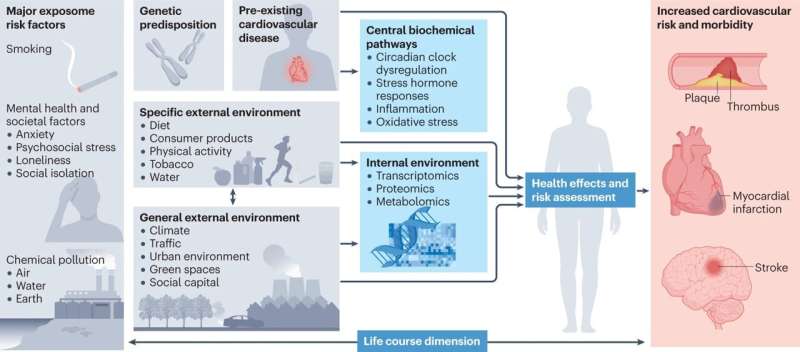This article has been reviewed according to Science X's editorial process and policies. Editors have highlighted the following attributes while ensuring the content's credibility:
fact-checked
proofread
The exposome concept: How an unhealthy environment causes cardiovascular disease

Environmental stressors such as air pollution, noise, unhealthy urban planning, and climate change increase the risk of cardiovascular disease, as do traditional risk factors such as smoking, unhealthy diet, and physical inactivity. An article recently published in Nature Reviews Cardiology by an international team of researchers describes the effects of environmental stressors on the cardiovascular system using the exposome concept.
The exposome concept describes lifetime exposure to all environmental risk factors and their adverse effects on the organism and health. This emerging field of research links the effects of adverse environmental exposures on health to pathophysiological changes in the body, chronic disease, and death. The application of the exposome concept to the cardiovascular field is the subject of this article.
Large epidemiologic studies have shown that nearly two-thirds of annual deaths worldwide are caused by chronic non-communicable diseases, with cardiovascular diseases being the leading cause. Contributing factors include an aging population and environmental stressors such as land, water, air, and noise pollution, unhealthy urban design, and unhealthy lifestyles.
Two-thirds of noncommunicable diseases caused by environmental factors
Environmental physicians estimate that two-thirds of chronic non-communicable diseases are due to the sum of all environmental factors and that 16 to 22 percent of global deaths (9 to 12.6 million) are caused by chemical pollution alone. The exposome concept describes the deleterious biochemical and metabolic changes that occur due to multiple environmental exposures and can ultimately lead to adverse health outcomes and premature death.
The authors present selected cardiovascular exposome studies and show that exposures are associated with inflammation, adverse metabolic changes, and dysregulated DNA methylation (epigenetic changes) and can lead to increased blood pressure and other adverse health outcomes.
For example, the European Human Exposome Network, launched in 2020, is investigating environmental influences on the health of Europeans. More than 22 million workers will be screened for workplace exposures, focusing on chemical toxins, noise, and psychosocial stress. In addition, more than 2 million subjects will be studied using various techniques and methods to find links between exposure and health.
Exposome concept as basis for prevention strategies
Advanced tools and techniques for conducting exposome research will be presented. Mobile personal sensors allow lifetime data collection with high spatial and temporal resolution. Satellite-based exposure monitoring also contributes to a complete exposure history. However, exposome research needs help, such as analytical limitations and a complete lifetime exposure history.
Another challenge is the problem of multiple exposures to environmental toxicants, for which there are few statistical and mathematical solutions.
The authors of the paper, Professors Thomas Münzel and Andreas Daiber from the Center for Cardiology at the University Medical Center Mainz and from the German Centre for Cardiovascular Research (DZHK) comment, "The exposome concept is an important new approach to study environmental influences on health and may help to develop prevention strategies to reduce the risk of cardiovascular and other chronic non-communicable diseases."
The authors also emphasize the need for further research to gain a comprehensive understanding of the exposome and to examine the effects of the environmental exposome on different organ systems and disease states. It is essential to quantify and account for individual exposures, as exposure to environmental factors is highly dependent on factors such as location, occupation, and individual behavior.
More information: Thomas Münzel et al, The contribution of the exposome to the burden of cardiovascular disease, Nature Reviews Cardiology (2023). DOI: 10.1038/s41569-023-00873-3




















